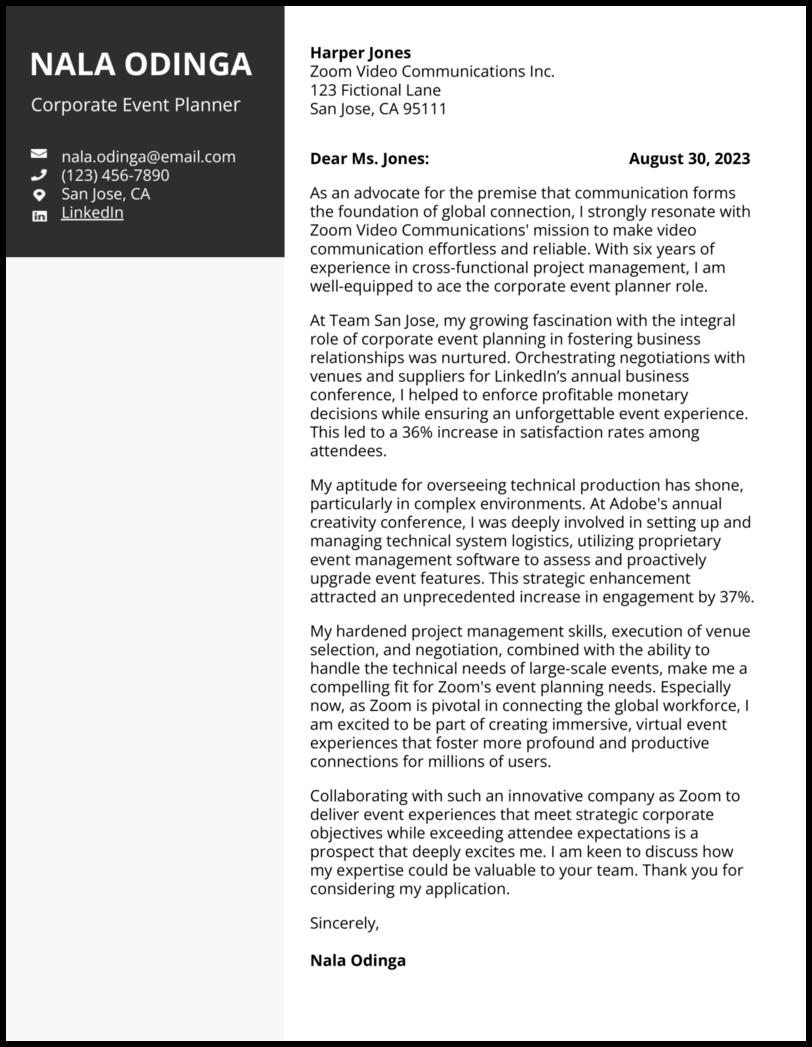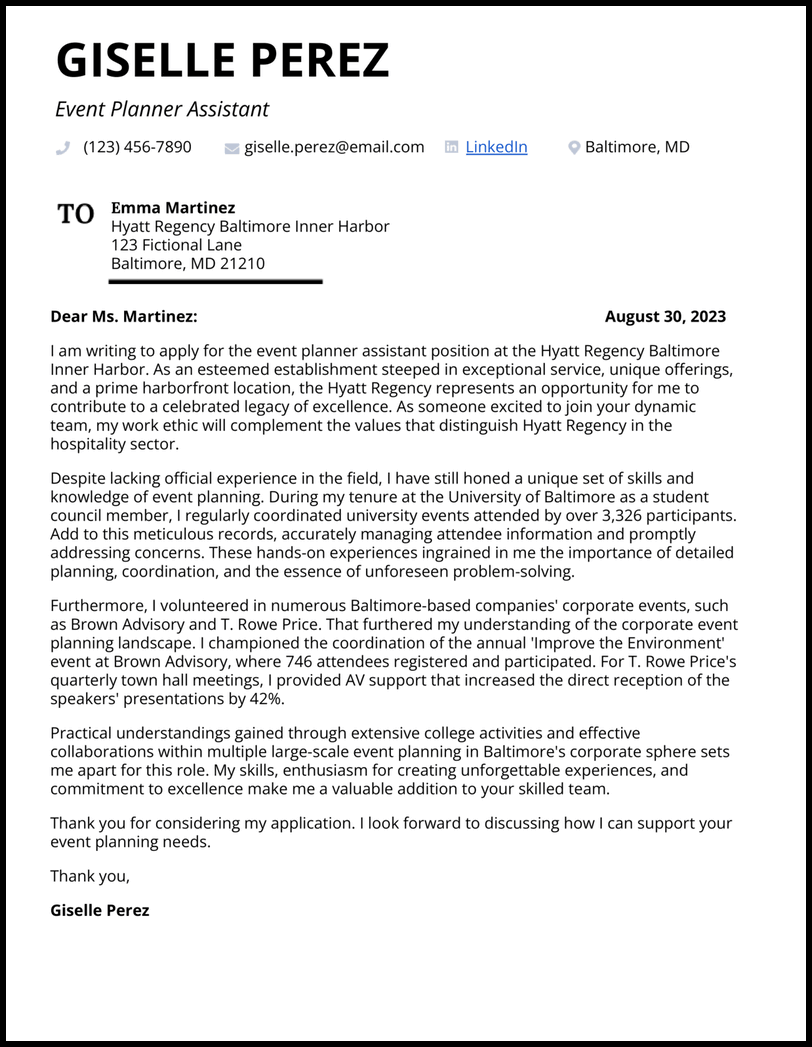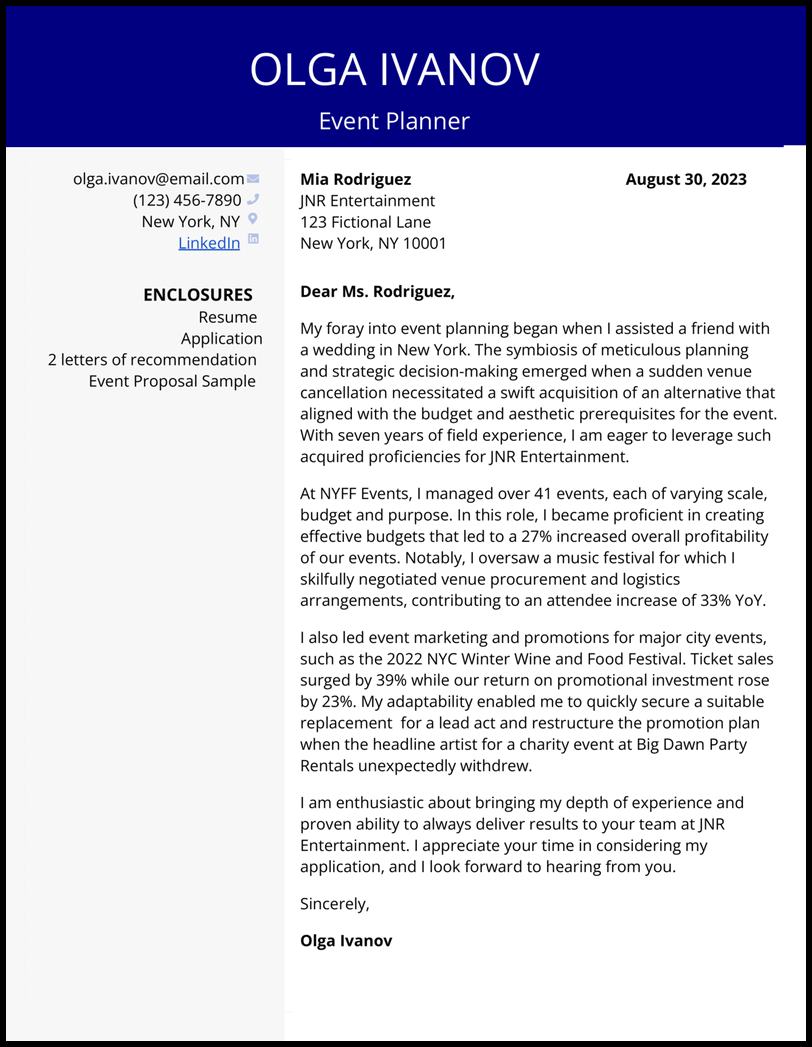




You’ve got planning skills that could put even the most organized people to shame, and you supplement them with boundless creativity that helps you set up successful events. From juggling a tight budget to negotiating various venues, you’re on top of it all, delivering superb experiences to all attendees.
Creating a cover letter to complement your event planner resume is a bit like setting up an event—it can be time-consuming and requires meticulous attention to detail, but if you ace it, your career will flourish.
We’re here to make the whole process easier. Start with our event planner cover letter examples and AI cover letter generator, and we’ll show you how to emphasize your strengths and wow potential employers!
Copy this text for your event planner cover letter!
123 Fictional Avenue
New York, NY 10001
(123) 456-7890
August 30, 2026
Mia Rodriguez
JNR Entertainment
123 Fictional Lane
New York, NY 10001
Dear Ms. Rodriguez,
My foray into event planning began when I assisted a friend with a wedding in New York. The symbiosis of meticulous planning and strategic decision-making emerged when a sudden venue cancellation necessitated a swift acquisition of an alternative that aligned with the budget and aesthetic prerequisites for the event. With seven years of field experience, I am eager to leverage such acquired proficiencies for JNR Entertainment.
At NYFF Events, I managed over 41 events, each of varying scale, budget and purpose. In this role, I became proficient in creating effective budgets that led to a 27% increased overall profitability of our events. Notably, I oversaw a music festival for which I skilfully negotiated venue procurement and logistics arrangements, contributing to an attendee increase of 33% YoY.
I also led event marketing and promotions for major city events, such as the 2022 NYC Winter Wine and Food Festival. Ticket sales surged by 39% while our return on promotional investment rose by 23%. My adaptability enabled me to quickly secure a suitable replacement for a lead act and restructure the promotion plan when the headline artist for a charity event at Big Dawn Party Rentals unexpectedly withdrew.
I am enthusiastic about bringing my depth of experience and proven ability to always deliver results to your team at JNR Entertainment. I appreciate your time in considering my application, and I look forward to hearing from you.
Sincerely,
Olga Ivanov
Enclosures:
Resume
Application
2 letters of recommendation
Event Proposal Sample
Why this cover letter works
- This event planner cover letter sets the tone with an antidote that infused storytelling but, most importantly, showcases the candidate’s problem-solving prowess.
- Note how the candidate carries on to highlight her event planning experiences, enriching them with quantified wins while paying specific attention to relevant skills like negotiation, crisis management, and strategic decision-making.
Level up your
cover letter game
Relax! We’ll do the heavy lifting to write your cover letter in seconds.
Copy this text for your event planner no experience cover letter!
123 Fictional Avenue
Baltimore, MD 21210
(123) 456-7890
August 30, 2026
Emma Martinez
Hyatt Regency Baltimore Inner Harbor
123 Fictional Lane
Baltimore, MD 21210
Dear Ms. Martinez:
I am writing to apply for the event planner assistant position at the Hyatt Regency Baltimore Inner Harbor. As an esteemed establishment steeped in exceptional service, unique offerings, and a prime harborfront location, the Hyatt Regency represents an opportunity for me to contribute to a celebrated legacy of excellence. As someone excited to join your dynamic team, my work ethic will complement the values that distinguish Hyatt Regency in the hospitality sector.
Despite lacking official experience in the field, I have still honed a unique set of skills and knowledge of event planning. During my tenure at the University of Baltimore as a student council member, I regularly coordinated university events attended by over 3,326 participants. Add to this meticulous records, accurately managing attendee information and promptly addressing concerns. These hands-on experiences ingrained in me the importance of detailed planning, coordination, and the essence of unforeseen problem-solving.
Furthermore, I volunteered in numerous Baltimore-based companies’ corporate events, such as Brown Advisory and T. Rowe Price. That furthered my understanding of the corporate event planning landscape. I championed the coordination of the annual ‘Improve the Environment’ event at Brown Advisory, where 746 attendees registered and participated. For T. Rowe Price’s quarterly town hall meetings, I provided AV support that increased the direct reception of the speakers’ presentations by 42%.
Practical understandings gained through extensive college activities and effective collaborations within multiple large-scale event planning in Baltimore’s corporate sphere sets me apart for this role. My skills, enthusiasm for creating unforgettable experiences, and commitment to excellence make me a valuable addition to your skilled team.
Thank you for considering my application. I look forward to discussing how I can support your event planning needs.
Thank you,
Giselle Perez
Why this cover letter works
- Even without formal experience in event planning, that shouldn’t deter you from showcasing enthusiasm for and understanding of the job and company in your event planner no experience cover letter.
- However, highlighting proficiency acquired through internships or volunteer programs and their impact is an excellent way to compensate for the lack of professional experience.
Copy this text for your event manager cover letter!
123 Fictional Avenue
Denver, CO 80201
(123) 456-7890
August 30, 2026
Olivia Jones
Hyatt Regency DTC
123 Fictional Lane
Denver, CO 80201
Dear Ms. Jones:
I knew I had to apply here since I attended a corporate event at Hyatt Regency DTC and witnessed its commitment to fostering luxurious, seamless events. With over three years of experience in event planning and coordination, coupled with a Bachelor’s degree in Hospitality from the University of Nevada, I am confident I can contribute to your esteemed venue’s success as an event manager.
While working as an event manager at the Reno-Sparks Convention and Visitors Authority, I handled 39 virtual county events with EventMobi, increasing the average attendance by 16% each year. Using best event management practices, I further mitigated last-minute mishaps by 6% compared to previous event metrics.
My role managing a $74K+ annual marketing budget as an event coordinator for Zappos further demonstrates my ability to deliver high-impact results cost-efficiently. By practicing vendor and stakeholder management, I nurtured strong long-term relationships with four high-value vendors for the company.
I’ve also managed contract negotiations and on-site operations for Courtyard Denver Cherry Creek, which led to a 9% increase in satisfaction scores per monthly surveys. Introducing tools like HubSpot and Mailchimp, I automated 11 marketing tasks, which aligns with Hyatt Regency’s mission of efficient event planning.
I look forward to bringing my expertise in event planning, vendor management, and marketing to Hyatt Regency DTC. Please let me know a suitable time to schedule an interview to discuss this role in greater detail.
Sincerely,
Isla Murray
Enclosures:
Resume
Application
Transcripts
Why this cover letter works
- Got a special reason why you’re applying to a specific company? Don’t be shy about spilling the tea. From experiencing high-quality hospitality yourself to reading glowing reviews, let the company know why they’re so special.
- Isla’s event manager cover letter is a good example of using storytelling elements. She weaves a great story about her experience at the Hyatt, sharing how it inspired her to apply and showing employers she’s not just after the paychecks.
Copy this text for your event coordinator cover letter!
123 Fictional Avenue
San Jose, CA 95111
(123) 456-7890
October 20, 2026
Harper Jones
Zoom Video Communications Inc.
123 Fictional Lane
San Jose, CA 95111
Dear Mr. Collins,
Creating memorable and engaging events has been the essence of my career for the longest. Twitch’s mission to unite gamers and creators via innovative events aligns with my passion for fostering fun environments. My background in event planning includes all the qualities you’re looking for in your next event coordinator for Twitch’s continued success.
While at Edge of Astoria, I coordinated 55+ diverse events on Cvent, expertly managing relationships with nine vendors while ensuring the company didn’t spend beyond its planned budget. This role demanded heavy client handling and precision, and as such, I helped the company maintain an average 97% positive client satisfaction rate per annual anonymous surveys.
Previously at Matlen Silver, I assisted with the planning and executing events that achieved 86% of targeted attendance, effectively working in a team of 4 event assistant managers. This experience honed my skills in understanding the needs of large-scale projects in a fast-paced environment and driving successful outcomes using tools like Eventbrite and Momentus Technologies.
Additionally, my role as a receptionist at Pediatric Health Group developed my communication and organizational skills. Guiding an average of 18 patients daily with Google Workspace and Oracle Health improved my ability to solve problems with critical thinking. This background compliments my most recent event coordination experience, forming a well-rounded skill set that I am excited to bring to your team.
I’m ready to leverage my problem-solving approach and attention to detail at Twitch. I’m eager to hop on a call and discuss how my previous work experiences can contribute to your team’s success. Thank you for considering my application.
Sincerely,
Ethan Lee
Enclosures:
Resume
2 letters of recommendation
Transcript
Why this cover letter works
- Look at the company you’re applying to and its culture. Are they stricter than a school’s principal? Or more laid-back like a group of lifelong friends?
- Align your language according to their corporate values. For the buttoned-up types, go formal and throw in some fancy vocab in your event coordinator cover letter. But if the company seems fun and easygoing, loosen up a little to say, “We’re rocking the same vibes!”
Copy this text for your corporate event planner cover letter!
123 Fictional Avenue
San Jose, CA 95111
(123) 456-7890
August 30, 2026
Harper Jones
Zoom Video Communications Inc.
123 Fictional Lane
San Jose, CA 95111
Dear Ms. Jones:
As an advocate for the premise that communication forms the foundation of global connection, I strongly resonate with Zoom Video Communications’ mission to make video communication effortless and reliable. With six years of experience in cross-functional project management, I am well-equipped to ace the corporate event planner role.
At Team San Jose, my growing fascination with the integral role of corporate event planning in fostering business relationships was nurtured. Orchestrating negotiations with venues and suppliers for LinkedIn’s annual business conference, I helped to enforce profitable monetary decisions while ensuring an unforgettable event experience. This led to a 36% increase in satisfaction rates among attendees.
My aptitude for overseeing technical production has shone, particularly in complex environments. At Adobe’s annual creativity conference, I was deeply involved in setting up and managing technical system logistics, utilizing proprietary event management software to assess and proactively upgrade event features. This strategic enhancement attracted an unprecedented increase in engagement by 37%.
My hardened project management skills, execution of venue selection, and negotiation, combined with the ability to handle the technical needs of large-scale events, make me a compelling fit for Zoom’s event planning needs. Especially now, as Zoom is pivotal in connecting the global workforce, I am excited to be part of creating immersive, virtual event experiences that foster more profound and productive connections for millions of users.
Collaborating with such an innovative company as Zoom to deliver event experiences that meet strategic corporate objectives while exceeding attendee expectations is a prospect that deeply excites me. I am keen to discuss how my expertise could be valuable to your team. Thank you for considering my application.
Sincerely,
Nala Odinga
Why this cover letter works
- Aligning your passion with the hiring company’s mission right at the beginning of your corporate event planner cover letter is highly commendable.
- But again, expressing your enthusiasm and the fact that you researched the company isn’t enough to land you an interview. Solidify your capacity and credibility, citing specific examples of positive outcomes from your past interventions.
Related cover letter examples
How to Craft an Event Planner Cover Letter That Gets You the Job

When it comes to event planning, no two job descriptions are exactly the same. You might be applying to help couples set up their dream weddings, but you could also spearhead high-level corporate events or product launches. Each of those jobs calls for a particular skill set.
To show employers that you’re ready to go, make sure to always tailor your cover letter to match the role. Emphasize the skills and achievements most relevant to the job—it shows that you’re dedicated, an essential trait in your line of work.

Impress them right away with an exciting opener
Much like the events you’ve planned in the past had to be thrilling from start to finish, your cover letter needs to open on a strong note for the hiring manager to keep on reading it. Apply all of your creativity to hook the reader and show that you’re paying attention.
For starters, the greeting should be personalized, so address the recruiter or hiring manager by name if at all possible. If you’ve tried everything and still couldn’t find the name, a “Dear Hiring Manager” or “Dear [Company Name] Team” will do.
Next, establish yourself as an expert event planner. Pick a skill or accomplishment that you’re most proud of and express how excited you are to use your expertise to make an impact at that particular company. Don’t be afraid to write a few versions of this paragraph before you settle on one that underscores your background in event planning the most.
Here’s what not to do. The opener below doesn’t speak to the candidate’s strengths and instead focuses on their lack of experience.
Better not!
I’ve never worked as an event planner before but I have been to a few weddings so I pretty much know how things work.
This is much, much better. The applicant instantly drives a personal connection to the company and paints themselves as a seasoned professional.
That’s impressive!
My foray into event planning began when I assisted a friend with a wedding in New York. The symbiosis of meticulous planning and strategic decision-making emerged when a sudden venue cancellation necessitated a swift acquisition of an alternative that aligned with the budget and aesthetic prerequisites for the event. With seven years of field experience, I am eager to leverage such acquired proficiencies at JNR Entertainment.

Show off your skills in the body paragraphs
This is where you can expand on what you’ve talked about in your event planner resume and discuss how your background and skills contributed to running successful events.
Don’t make the mistake of listing your daily tasks here, though. Use this space as a galore of your greatest accomplishments, complete with added metrics, and update it as needed to pick the achievements that closely align with the job listing.
Talk about success stories, such as how many events you’ve planned and of what kind. Discuss how your excellent financial management helped you stay under budget each time, saving the company $250,000 annually, or how your unique approach to destination weddings increased your client base by 48% over 2 years.
Amazing!
My aptitude for overseeing technical production has shone, particularly in complex environments. At Adobe’s annual creativity conference, I was deeply involved in setting up and managing technical system logistics, utilizing proprietary event management software to assess and proactively upgrade event features. This strategic enhancement attracted an unprecedented increase in engagement by 37%.

Leave a great impression with your closing paragraph
You’ve contributed to events that will be remembered for years. When it comes to writing the final paragraph of your cover letter, aim to conjure a similar sentiment in the reader—you want them to walk away feeling that you’re the person they need for the job.
Use this space to circle back to what makes you a great fit—for instance, if the role involves planning conferences for software engineers, mention how your connections in the tech space help you reach out to relevant speakers for various keynotes.
Express how much you want to leverage your background to bring a positive outcome to every event, and mention the company by name to make more of an impact.
The example below doesn’t really do the job—it’s generic to the point where it could apply to any role.
That didn’t work…
I can start working anytime and will be available on all weekdays apart from next month because I’m going on vacation. Thanks for reading. Please call me to set up an interview.
This applicant shows genuine excitement for working at that particular company, so their signoff is far more impressive.
Well done!
Collaborating with such an innovative company as Zoom to deliver event experiences that meet strategic corporate objectives while exceeding attendee expectations is a prospect that deeply excites me. I am keen to discuss how my expertise could be valuable to your team. Thank you for considering my application.
Cover Letter Tips for an Event Planner
- Keep it organized like you do with events
- Using a professional format and structure in your event planner cover letter will make your organizational abilities shine immediately when a hiring manager opens it. Cover letter templates will help you with the structure so you maintain defined paragraphs, include your contact information at the top, and properly address the hiring manager by name.
- Focus on a few key event-planning skills
- You juggle a lot on the job, managing negotiations, setup, transportation, and more. However, with a short one-page cover letter, you’ll want to focus on a few essential skills that make you shine to avoid losing a hiring manager’s attention. Review the job description to see what the company emphasizes. Do they need help with ticket sales? Then, focusing on promotional skills would be ideal to show you can get more traffic to events.
- Showcase your problem-solving abilities
- During the event planning process, you’ll experience your fair share of shakeups. Venues will be canceled, or products or services you ordered won’t be delivered on time. When you can show how you overcame an obstacle, it’ll reassure hiring managers you can handle those stressful moments. For example, you could discuss how you used your negotiation skills to make a last-minute venue change that resulted in 96% positive satisfaction scores from attendees.
Use some of those strong research skills you’ve honed during your career as an event planner and do a bit of digging. LinkedIn and the company website are both great resources, as is the email address of the person you’re sending your application to. As a last resort, don’t be afraid to email or call the company to find the name.
There are many transferable skills that can be useful for an event planner, so lean into those when you discuss your past experience. For instance, if you were a stay-at-home parent before, you could talk about how your ability to run the household and make various appointments made you develop some next-level planning skills.
Let the job description and the company website be your guide. For instance, if you’re applying to become a corporate event planner, keep things formal and respectful. However, if you’re hoping to plan concerts and other large-scale entertainment events, a dash of casual enthusiasm often won’t hurt.






